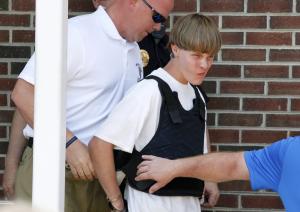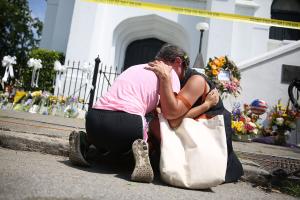BEIJING (AP) — Often the target of U.S. human rights accusations, China wasted little time returning such charges following the shooting at a historic black church in South Carolina that left nine people dead. Elsewhere around the world, the attack renewed perceptions that Americans have too many guns and have yet to overcome racial tensions.
Some said the attack reinforced their reservations about personal security in the U.S. — particularly as a non-white foreigner — while others said they'd still feel safe if they were to visit.
Especially in Australia and northeast Asia, where firearms are strictly controlled and gun violence almost unheard of, many were baffled by the determination among many Americans to own guns despite repeated mass shootings, such as the 2012 tragedy at Sandy Hook Elementary School in Newtown, Connecticut, where a gunman killed 20 children and six adults.
"We don't understand America's need for guns," said Philip Alpers, director of the University of Sydney's GunPolicy.org project that compares gun laws across the world. "It is very puzzling for non-Americans."
A frontier nation like the U.S., Australia had a similar attitude toward firearms prior to a 1996 mass shooting that killed 35. Soon after, tight restrictions on gun ownership were imposed and no such incidents have been reported since.
A similar effect has been seen elsewhere.
"The USA is completely out of step with the rest of the world. We've tightened our gun laws and have seen a reduction," said Claire Taylor, the director of media and public relations at Gun Free South Africa.
Ahmad Syafi'i Maarif, a prominent Indonesian intellectual and former leader of Muhammadiyah, one of the country's largest Muslim organizations, said the church shooting shocked many.
"People all over the world believed that racism had gone from the U.S. when Barack Obama was elected to lead the superpower, twice," he said. "But the Charleston shooting has reminded us that in fact, the seeds of racism still remain and were embedded in the hearts of small communities there, and can explode at any time, like a terrorist act by an individual."
A 21-year-old white man, Dylann Storm Roof, now faces nine counts of murder for the South Carolina shooting. An acquaintance said Roof had complained that "blacks were taking over the world."
View gallery

Police lead suspected shooter Dylann Roof, 21, into the courthouse in Shelby, North Carolina, June 1 …
Many places around the world struggle with racism and prejudice against outsiders, but mass shootings in the U.S., where the Constitution's second amendment protects the right to keep and bear arms, often receive widespread global attention.
"Guns are in their constitution," said Joanna Leung, a 34-year-old Toronto resident. "I'm pretty sure no one else has anything similar. I never understand why they think gun violence is going to solve anything."
In Britain, the attack reinforced the view that America has too many guns and too many racists. The front-page headline of The Independent newspaper said simply, "America's shame."
The newspaper said in an editorial that America seems to have moved backward in racial relations since Obama's election, and that the "obscene proliferation of guns only magnifies tragedies" like the church shooting.
The leftist Mexico City newspaper La Jornada said the U.S. has become a "structurally violent state" where force is frequently used domestically and internationally to resolve differences.
"In this context, the unchecked and even paranoid citizen armament is no coincidence: Such a phenomenon reflects the feeling of extensive sectors about the supposed legitimacy of violent methods," it said.
In China, the official Xinhua News Agency said the violence in South Carolina "mirrors the U.S. government's inaction on rampant gun violence as well as the growing racial hatred in the country."
"Unless U.S. President Barack Obama's government really reflects on his country's deep-rooted issues like racial discrimination and social inequality and takes concrete actions on gun control, such tragedy will hardly be prevented from happening again," Xinhua said in an editorial.
On China's Twitter-like Weibo microblogging service, some users compared the United States to lawless Somalia and said racial discrimination was fueling violence and high crime rates. Many reflected the official view that gun ownership and violent crime are byproducts of Western-style democratic freedoms that are not only unsuited to China but potentially disastrous.
View gallery

Women comfort each other as they mourn in front of the Emanuel African Methodist Episcopal Church af …
Recalling the recent killings of Chinese and other foreign students in the U.S., office worker Xie Yan said he was still eager to visit the U.S., but would be "extremely careful" there.
Xie said he had heard much about racism in the U.S., but was uncertain about the underlying dynamics.
"We tend to see the U.S. as a violent place, but I don't think we understand a lot about racism there. Chinese are free to study, visit and live there so it doesn't feel like we're discriminated against," Xu said while waiting for a train on Beijing's busy subway line 1.
Like Australia, China has had its problems with racial and ethnic discrimination. China is overwhelmingly dominated by one ethnic group, the Han, and activists decry the lack of awareness about discrimination in jobs and housing faced by minorities such as Tibetans and Turkic Muslim Uighurs from the northwest.
Chinese police have been accused of heavy-handed tactics against those labeled separatists or terrorists, although such measures appear to be supported by most Chinese.
In Japan, discrimination tends to be based less on skin color than on national origin, resulting in biases against Chinese and Koreans, said Hiroko Takimoto, 41, a patent attorney in Tokyo.
Racially motivated killings are "simply something Japanese as a people cannot understand," she said.
Yukari Kato, vice president of the company Ryugaku Journal that assists Japanese students on overseas programs, including about 2,000 in the U.S., said violence there was nothing new and most of the country remained perfectly safe.
"It's no different from Japan. There are places where you can become a victim of crime. You just have to be prepared to defend yourself," she said.
However, Yuka Christine Koshino, 21, a political science student at Tokyo's Keio University, said she was devastated by the shootings, particularly after having participated in racism awareness campaigns while studying at the University of California, Berkeley. Those interactions had given her hope that the situation was improving. The shootings "shocked me," said Koshino.
Chairman of the Philippine Alliance of Human Rights Advocates Max de Mesa shared the sentiment of civil rights activists in South Carolina who pointed out that the Confederate battle flag, the symbol of the pro-slavery South during the Civil War, continued to fly over the state even as it mourned.
"Some of the (old) structures and some of the attitudes remain and they were even nurtured, at least that is being shown now," de Mesa said.
"That would be no different from a suicide bomber," he said. "For a jihadist, 'I will be with Allah if I do that.' The other says, 'I am proving white supremacy here.'"
Indonesian intellectual Syafi'i Maarif said he hoped the incident would help Americans stop equating terrorism with Islam.
"Terrorism and radicalism can appear in every strata of society under various guises and in the name of ethnicity, religion and race," he said.

___Associated Press writers Kristen Gelineau in Sydney, Gregory Katz in London, Robert Gillies in Toronto, Niniek Karmini in Jakarta, Indonesia, Oliver Teves in Manila, Philippines, John Rice in Mexico City, Courtney Quirin in Johannesburg and Yuri Kageyama in Tokyo contributed to this report.